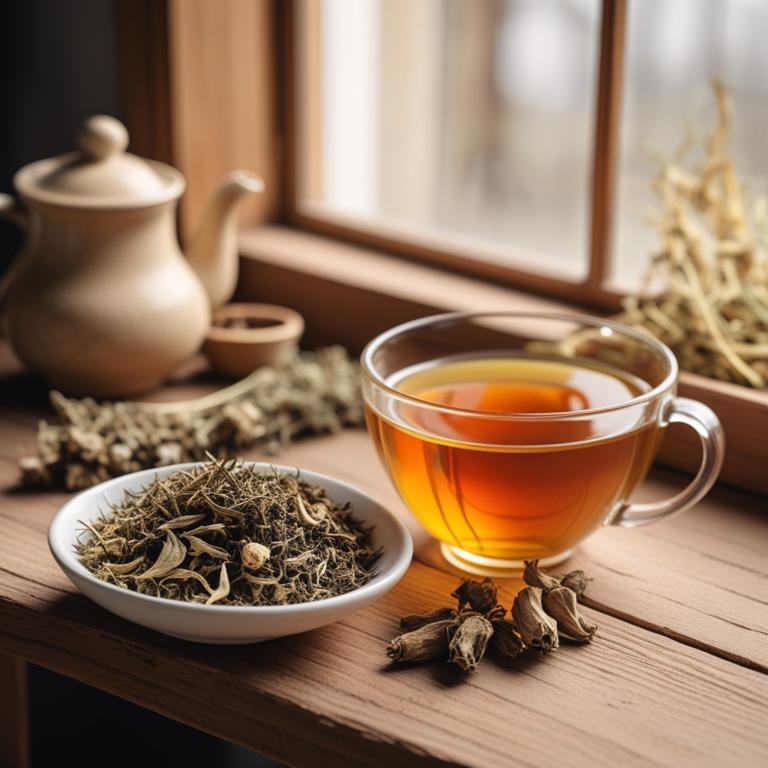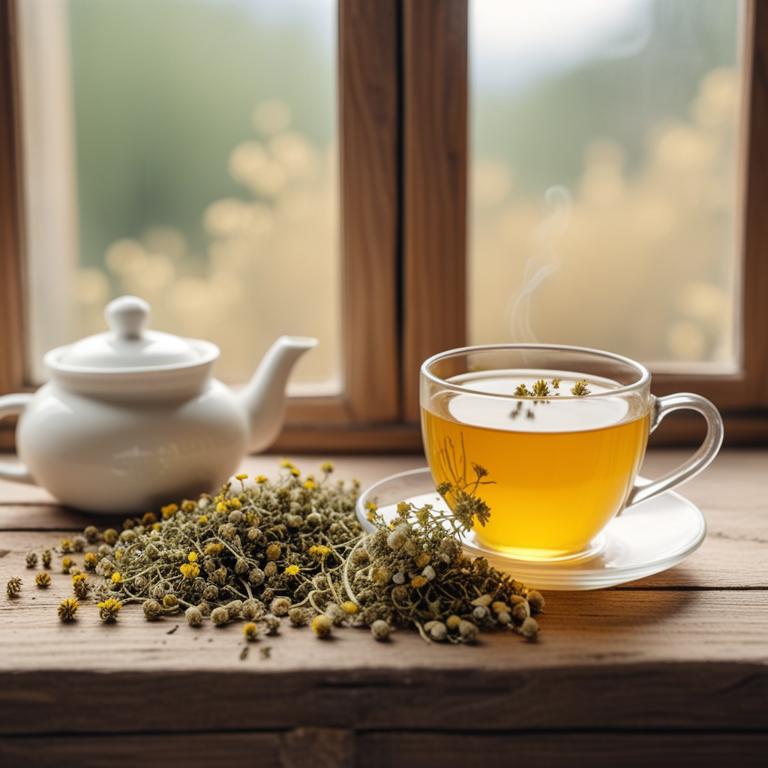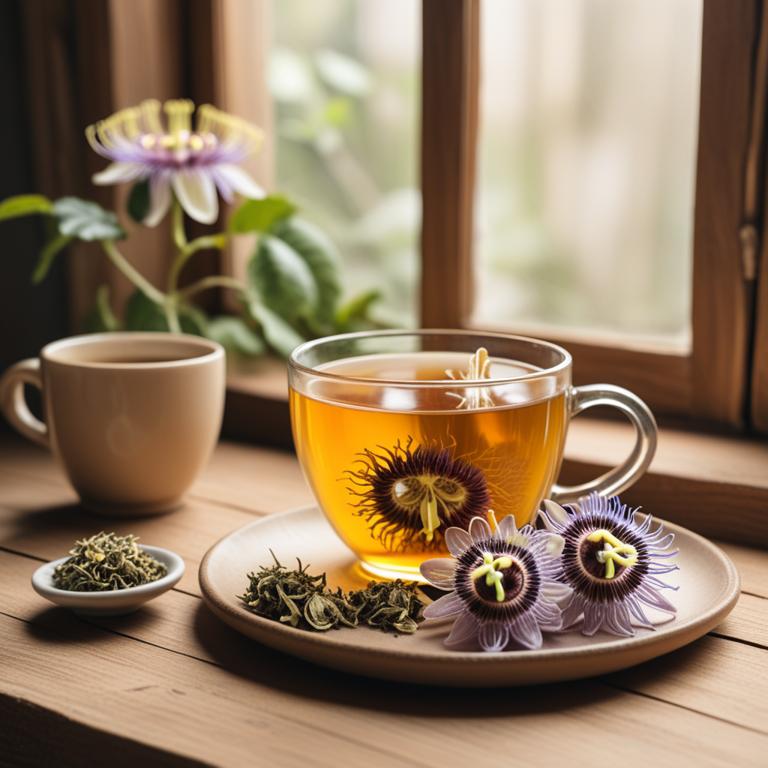11 Best Herbal Teas For Headaches

Herbal teas for Headaches are a natural remedy made from various plants, flowers, and herbs that have been used for centuries to alleviate and treat headaches.
These teas have numerous benefits, including reducing inflammation, relaxing muscles, and improving blood flow to the brain, making them an effective alternative to over-the-counter medications.
Examples of herbal teas used to treat headaches include Feverfew, which contains a compound called parthenolide that helps to reduce inflammation and pain; Ginger, which has anti-inflammatory properties that can help to alleviate migraine symptoms; Peppermint, which can help to relax muscles and improve blood flow; Willow Bark, which contains salicin, a compound similar to aspirin that can help to reduce pain and inflammation; Lavender, which can help to promote relaxation and reduce stress; and Rosemary, which can help to improve blood flow and reduce pain.
By incorporating these herbal teas into your daily routine, you can experience a natural and effective way to manage and alleviate headaches.
According to "Phytotherapy research : PTR", teas for headaches may be an effective option, as herbal treatments such as feverfew, butterbur, curcumin, and others have shown positive, albeit limited evidence for the acute or prophylactic treatment of migraine, although further research is necessary to confirm their efficacy and safety.
Below there's a list of the 11 best herbal teas for headaches.
- 1. Matricaria chamomilla teas
- 2. Foeniculum vulgare teas
- 3. Passiflora incarnata teas
- 4. Valeriana officinalis teas
- 5. Lavandula angustifolia teas
- 6. Melissa officinalis teas
- 7. Zingiber officinale teas
- 8. Ginkgo biloba teas
- 9. Achillea millefolium teas
- 10. Lavandula latifolia teas
- 11. Curcuma longa teas
Also you may be interested in...
TODAY'S FREE BOUNDLE
Herb Drying Checklist + Herbal Tea Shopping List + Medicinal Herbs Flashcards
Enter you best email address below to receive this bundle (3 product valued $19.95) for FREE + exclusive access to The Aphotecary Letter.
$19.95 -> $0.00
1. Matricaria chamomilla teas

Matricaria chamomilla teas have been traditionally used to treat headaches due to their analgesic, anti-inflammatory, and soothing properties.
The apigenin and luteolin present in this herbal preparation help to treat headaches by reducing inflammation and relaxing muscle tension, thereby alleviating pain and discomfort.
The flavonoids and terpenoids in Matricaria chamomilla teas also contribute to their analgesic and sedative effects, promoting relaxation and reducing stress that can contribute to headaches.
Regular consumption of Matricaria chamomilla teas may help to prevent recurring headaches and improve overall well-being by reducing anxiety and promoting a good night's sleep.
Related Study
According to "Phytotherapy research : PTR", Matricaria chamomilla teas for headaches showed positive, preliminary findings as an acute treatment.
2. Foeniculum vulgare teas

Foeniculum vulgare teas, also known as anise or fennel tea, have been traditionally used to treat headaches due to their anti-inflammatory and analgesic properties.
The bioactive constituents such as anethole, limonene, and fenchone help to alleviate headache symptoms by reducing muscle spasms and relieving pain.
Drinking Foeniculum vulgare teas may also help to treat headaches by promoting relaxation, reducing stress, and improving sleep quality.
The benefits of using Foeniculum vulgare teas to treat headaches include their natural and non-addictive properties, making them a safe and effective alternative to over-the-counter medications.
Related Study
According to "Journal of integrative medicine", Foeniculum vulgare teas for headaches may be beneficial due to its gastroprotective effects, such as reducing Helicobacter pylori growth and improving gastric mucosal resistance, which can help manage gastrointestinal disorders associated with headaches.
3. Passiflora incarnata teas

Passiflora incarnata teas, also known as passionflower tea, have been traditionally used to treat headaches due to their analgesic and anti-anxiety properties.
The herbal preparation contains bioactive constituents such as flavonoids, alkaloids, and glycosides that help to reduce inflammation and relax the muscles, thereby alleviating headache symptoms.
By promoting relaxation and reducing muscle tension, passionflower tea helps to alleviate headaches caused by stress and anxiety.
The benefits of using passionflower tea for headaches include its non-addictive and non-habit-forming nature, making it a safer alternative to pharmaceutical medications.
4. Valeriana officinalis teas

Valeriana officinalis teas have been traditionally used to treat headaches due to their sedative, anti-inflammatory, and analgesic properties.
The herbal preparation helps to treat this ailment by reducing muscle tension, promoting relaxation, and alleviating pain.
The bioactive constituents of Valeriana officinalis teas, including valerenic acid, isovaleric acid, and valepotriates, contribute to their therapeutic effects by interacting with the GABA receptor and modulating the activity of neurotransmitters.
The benefits of using Valeriana officinalis teas to treat headaches include reduced frequency and severity of episodes, improved sleep quality, and a decrease in reliance on pharmaceutical pain relief medications.
Related Study
According to "American journal of health-system pharmacy : AJHP : official journal of the American Society of Health-System Pharmacists", Valeriana officinalis teas for headaches have been studied in formal trials for potential efficacy.
5. Lavandula angustifolia teas

Lavandula angustifolia teas have been traditionally used to treat headaches due to their calming and soothing properties, which help to alleviate stress and anxiety that often trigger these episodes.
The bioactive constituents present in this herbal preparation, such as linalool and linalyl acetate, exhibit anti-inflammatory and analgesic properties that contribute to its headache-relieving effects.
By promoting relaxation, reducing muscle tension, and improving sleep quality, Lavandula angustifolia teas help to treat headaches by addressing their underlying causes.
The benefits of using Lavandula angustifolia teas to treat headaches include reduced frequency and severity of episodes, improved sleep quality, and a decrease in reliance on over-the-counter medications.
6. Melissa officinalis teas

Melissa officinalis teas, also known as lemon balm tea, have been traditionally used to treat headaches and promote relaxation.
The properties of this herbal preparation that help to treat this ailment include its calming and anti-inflammatory effects, which can help to reduce pain and tension.
The bioactive constituents of Melissa officinalis, including rosmarinic acid and citral, contribute to its analgesic and anti-spasmodic properties, which can help to ease headache symptoms.
The benefits of Melissa officinalis teas for treating headaches include reducing stress and anxiety, promoting better sleep, and providing a natural and non-invasive alternative to pharmaceutical medications.
Related Study
According to "Journal of ethnopharmacology", Melissa officinalis teas for headaches may be beneficial due to their potential anti-nociceptive properties, which are attributed to the modulation of KATP, opioidergic, and serotonergic pathways.
7. Zingiber officinale teas

Zingiber officinale teas, also known as ginger teas, have been traditionally used to treat headaches due to their anti-inflammatory and analgesic properties.
The bioactive constituents present in these teas, including gingerols and shogaols, help to inhibit the production of pro-inflammatory enzymes, thereby reducing pain and inflammation.
By acting on the trigeminal nerve, which is responsible for transmitting pain signals to the brain, ginger teas help to alleviate headache symptoms, providing relief from migraines and other types of headaches.
The benefits of using Zingiber officinale teas to treat headaches include their ability to reduce frequency and severity of attacks, as well as their potential to prevent triggers such as stress and hormonal changes.
Related Study
According to "Journal of ethnopharmacology", Zingiber officinale teas for headaches may exert abortive and prophylactic effects in migraine headache without any side-effects.
8. Ginkgo biloba teas

Ginkgo biloba teas have been traditionally used to treat headaches, a common ailment characterized by pain and discomfort in the head.
The anti-inflammatory and antioxidant properties of this herbal preparation help to reduce inflammation and alleviate pain, thereby providing relief from headaches.
The bioactive constituents of Ginkgo biloba, including flavonoids, bilobalide, and ginkgolides, work together to inhibit the production of pro-inflammatory chemicals and improve blood circulation, which contributes to its headache-relieving effects.
Regular consumption of Ginkgo biloba teas has been found to provide numerous benefits, including reduced frequency and severity of headaches, improved mood, and enhanced cognitive function.
9. Achillea millefolium teas

Achillea millefolium teas, also known as yarrow teas, have been used for centuries to treat headaches due to their analgesic, anti-inflammatory, and antispasmodic properties.
The bioactive constituents present in this herbal preparation, such as flavonoids, terpenoids, and sesquiterpene lactones, help to reduce pain and inflammation, ease muscle spasms, and promote relaxation, thereby alleviating headache symptoms.
The benefits of using Achillea millefolium teas to treat headaches include their ability to provide quick relief, reduce the frequency and severity of headaches, and promote overall well-being without the side effects associated with conventional medications.
Regular consumption of Achillea millefolium teas may also help to reduce stress and anxiety, which are often underlying causes of headaches.
10. Lavandula latifolia teas

Lavandula latifolia teas have been used traditionally to treat headaches, and research suggests that its properties may help alleviate this ailment.
The herbal preparation's calming and soothing effects are attributed to its ability to reduce inflammation and relax muscles, which helps to alleviate headache symptoms.
The bioactive constituents of Lavandula latifolia teas, including linalool and linalyl acetate, have been shown to possess analgesic and anti-inflammatory properties, which contribute to its headache-relieving effects.
Regular consumption of Lavandula latifolia teas may provide relief from headaches by promoting relaxation, reducing stress, and improving overall well-being.
11. Curcuma longa teas

Curcuma longa teas have been traditionally used to treat headaches due to their anti-inflammatory and analgesic properties, which help to alleviate pain and reduce inflammation in the body.
The bioactive constituents responsible for these effects include curcumin, a polyphenolic compound that inhibits pro-inflammatory enzymes and cytokines, thereby reducing the severity of headaches.
Drinking Curcuma longa teas may help to treat headaches by reducing the frequency and severity of migraine attacks, as well as providing relief from tension and stress-induced headaches.
The benefits of using Curcuma longa teas to treat headaches include reduced reliance on pharmaceutical medications, improved overall well-being, and a natural approach to managing chronic pain.
Related Study
According to "Phytotherapy research : PTR", Curcuma longa teas for headaches have shown positive, preliminary findings as a prophylactic treatment for migraine.